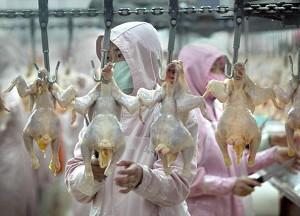BEIJING - China needs to improve its efforts to control bird flu, a leading Chinese expert on the disease said, adding to voices anxious about the country’s preparedness.
The scientist Liu Xiufan told a conference of prominent Chinese engineers and scientists on Monday that the government should review the effectiveness of measures to control bird flu, the official Xinhua news agency reported on Tuesday.
“We should do our best to reduce the risk of a human pandemic influenza breaking out and make necessary preparations before such a risk becomes a reality,” Liu, a veterinary expert at Yangzhou University in eastern China, was quoted as saying.
China has reported almost 40 outbreaks of bird flu in poultry across a dozen provinces over the past year, and 12 people are known to have died there of bird flu and six have survived.
Several international authorities have said they are worried that China and other developing countries are unable to effectively track outbreaks of the H5N1 avian flu virus.
Liu said China needed to control bird flu at its avian source to hold down the risk of transmission to humans.
Xinhua cited him as saying the H5N1 strain showed “increased virulence” among ducks and “currently available vaccines are not effective for protecting poultry.”
The H5N1 strain of bird flu has been largely confined to birds, but it has infected and killed some humans, and a flurry of human cases in Indonesia has raised fears about rising risks of human-to-human transmission, which could trigger a widespread outbreak among people.
Late in May, the avian influenza coordinator of the World Animal Health Organization (OIE), Christianne Bruschke, said China, Indonesia and countries in Africa may be underreporting outbreaks of bird flu among birds, because of poor diagnostic facilities and unwillingness of farmers to report.
Earlier that month, China sacked five local officials who ignored reports of suspected bird flu outbreaks in January.





